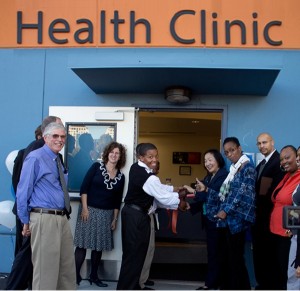 The national Community Preventive Services Task Force has recommended school-based health centers in low-income communities as an effective service to improve educational outcomes including school performance, grade promotion, and high school completion.
The national Community Preventive Services Task Force has recommended school-based health centers in low-income communities as an effective service to improve educational outcomes including school performance, grade promotion, and high school completion.
Public Statement | Detailed Finding
School-based health centers are also recommended because they provide low-income and minority students with health care and health education that gives them a chance to stay in school and perform better academically, which can lift whole communities.
In a statement accompanying the recommendation, the Task Force said:
“Children from low-income and racial and ethnic minority populations commonly experience worse health, are less likely to have a usual place of health care, and miss more days of school because of illness than do children from the less economically and socially disadvantaged populations.
“Addressing these obstacles can be critical to their education and long term health.”
The Task Force recommendation is based on a review of 46 studies on school-based health centers and their impact on health and education.
Education outcomes include:
- School performance
- Grade promotion
- High school completion
Health outcomes include:
- Delivery of vaccinations
- Other recommended preventive services
- Asthma morbidity
- Emergency department and hospital admission
- Contraceptive use among females
- Prenatal care and birth weight
- Other health risks
The Community Preventive Services Task Force (Task Force) is an independent, nonfederal, unpaid panel of public health and prevention experts that provides evidence-based findings and recommendations about community preventive services, programs, and policies to improve health. Task Force members are appointed by the Director of the Centers for Disease Control and Prevention (CDC).



